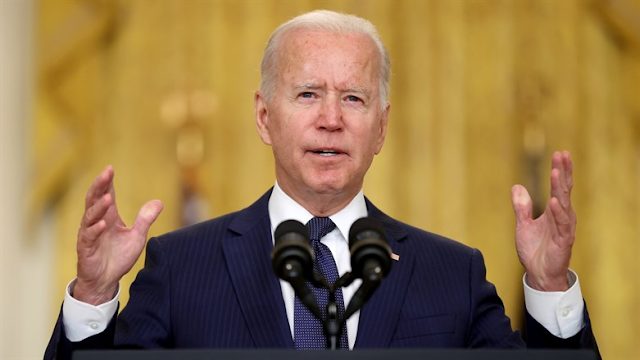(JNS) It’s hard not to sympathize a bit with Israeli Prime Minister Naftali Bennett and his coalition partner Foreign Minister Yair Lapid. Despite their best efforts to make nice with the Biden administration, they are quickly catching on to the fact that despite all the happy talk being exchanged between Washington and Jerusalem, the United States is about to leave the Jewish state out on a limb with respect to the greatest threat to its security.
That’s the upshot of an Axios report that states that Biden’s National Security Advisor Jake Sullivan told his Israeli counterpart, Bennett’s National Security Adviser Eyal Hulata, that the United States is re-adjusting its goals for ongoing nuclear talks with Iran, which are scheduled to resume later this month in Vienna. Rather than stick to its position about wanting the Islamist regime to re-enter the already dangerously weak 2015 deal negotiated by the Obama administration, the Americans are already waving the white flag on that point—let alone their supposed long-term objective of getting Iran to agree to a new, stronger agreement that would fix the problems with the original Joint Comprehensive Plan of Action.
According to the report, which the publication claims was confirmed by both Israeli and American sources, the Biden foreign-policy team is afraid that the situation is getting away from them. What they are now proposing is an interim agreement that will serve as a way to stall for more time rather than actually pressing Tehran to rejoin the old deal or face the consequences. Indeed, consequences—or anything like holding Iran accountable for the way it’s moving inexorably towards its nuclear goal—are not on the table.
The terms of the proposal involve getting Iran to agree to freeze its nuclear enrichment at current levels, estimated to be at the 60-percent level, in exchange for “some frozen Iranian assets” and “waivers on sanctions.”
There are two problems with this.
One is that bribing Iran with billions in order to, as former President Barack Obama disingenuously noted at the time, get them to “get right with the world” hasn’t worked. More gifts to the ayatollahs along with reduced sanctions will only reinforce that lesson.
The other is that it grants legitimacy to Iran’s current rogue behavior in pushing ahead with enrichment. The JCPOA was a disaster for Western security, though it did place some limits on Iran’s uranium enrichment activity—up to 3.67 percent. In the last six years, it’s been obvious that Iran was cheating on that, but by legitimizing the 60-percent level, the United States would be rewarding them for violating the accord.
If we’ve learned anything about the way Iran negotiates, we know that Tehran will never agree to get below that figure. The same Axios report noted that Hulata pointed this out to Sullivan, saying there is no such thing as a temporary concession to Iran. Anything they get becomes a permanent asset that they never surrender at the negotiating table. But neither Sullivan, nor anyone else in the Biden administration, seems capable of learning from their mistakes. Nothing can divert them from their blind faith in appeasement, whose only apparent goal seems to be to achieve a rapprochement with Iran at any cost.
This repeats the same pattern of Iran negotiations that led to the original deal, which not only was a financial bonanza for the regime, but allowed it to keep its nuclear program and advanced research along with sunset clauses that would give it a legal path to bomb by the end of this decade. Having entered the original Iran talks in 2013 with all the cards in his hand as a result of tough international sanctions that he had been dragged into by Congress, Obama and then-Secretary of State John Kerry proceeded to react to each “no” from Iran by simply dropping the matter and moving on to some other point that the Iranians would, in turn, also bluff them into conceding. READ MORE
Biden gives a clinic on how not to negotiate with Iran https://amos37.com/biden-gives-a-clinic-on-how-not-to-negotiate-with-iran/
| Josh Toupos |



















